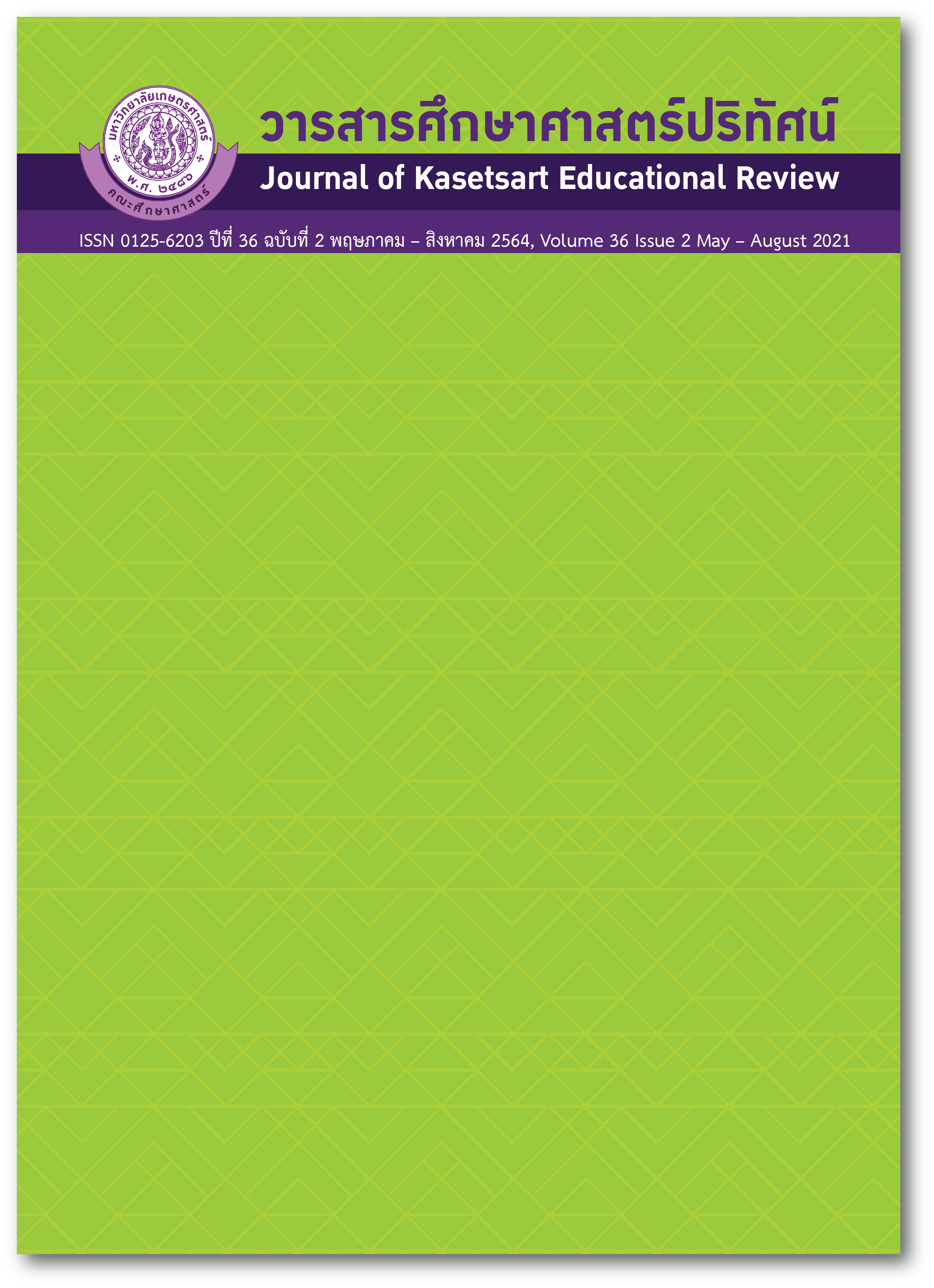แนวปฏิบัติที่ดีของฉันในการจัดการเรียนรู้โครงงานสะเต็มศึกษา เพื่อพัฒนาทักษะกระบวนการออกแบบเชิงวิศวกรรมของนักเรียนระดับชั้นมัธยมศึกษาปีที่ 3
คำสำคัญ:
การจัดการเรียนรู้โครงงานสะเต็มศึกษา, กระบวนการออกแบบเชิงวิศวกรรม, ทักษะกระบวนการออกแบบเชิงวิศวกรรมบทคัดย่อ
งานวิจัยปฏิบัติการในชั้นเรียนนี้มีวัตถุประสงค์เพื่อศึกษาแนวปฏิบัติที่ดีของฉันในการจัดการเรียนรู้โครงงานสะเต็มศึกษาที่เน้นกระบวนการออกแบบเชิงวิศวกรรมเพื่อพัฒนาทักษะกระบวนการออกแบบเชิงวิศวกรรมของนักเรียนระดับชั้นมัธยมศึกษาปีที่ 3 จำนวน 32 คน ของโรงเรียนประถมศึกษาแห่งหนึ่งในกรุงเทพมหานคร ฉันเก็บรวบรวมข้อมูลจากบันทึกหลังสอนของฉัน อนุทินบันทึกการเรียนรู้ของนักเรียน การสัมภาษณ์แบบกึ่งโครงสร้าง แบบบันทึกการสังเกต และแบบประเมินทักษะการออกแบบเชิงวิศวกรรม ฉันวิเคราะห์ข้อมูลทั้งหมดโดยการวิเคราะห์แบบอุปนัย โดยฉันพบว่าแนวปฏิบัติที่ดีในการจัดการเรียนรู้โครงงานสะเต็มศึกษาที่เน้นกระบวนการออกแบบเชิงวิศวกรรมเพื่อพัฒนาทักษะกระบวนการออกแบบเชิงวิศวกรรมของนักเรียน ดังนี้ 1) การทำให้นักเรียนมีประสบการณ์ตรงเกี่ยวกับสภาพปัญหาช่วยให้นักเรียนระบุปัญหาที่จะทำโครงงานสะเต็มศึกษาได้ชัดเจนขึ้น 2) การเชิญผู้เชี่ยวชาญมาในห้องเรียนร่วมกับการสืบค้นข้อมูลโดยใช้เทคโนโลยีทำให้นักเรียนได้ข้อมูลที่เป็นประโยชน์ในการวางแผนการทำโครงงานสะเต็มศึกษา 3) การใช้โปรแกรมออกแบบชิ้นงานสามมิติพร้อมทั้งใช้คำถามกระตุ้นคิดทำให้นักเรียนสร้างนวัตกรรมได้ตรงตามที่ออกแบบไว้มากขึ้น 4) การจัดทำรายการอุปกรณ์ที่จำเป็นและตรวจสอบรายละเอียดของอุปกรณ์ทำให้นักเรียนดำเนินการสร้างนวัตกรรมอย่างราบรื่น และ 5) การเขียนแผนผังความคิดที่ให้นักเรียนเห็นภาพรวมของกระบวนการออกแบบเชิงวิศวกรรมทุกขั้นตอนช่วยให้นักเรียนนำเสนอโครงงานสะเต็มศึกษาได้อย่างมีประสิทธิภาพมากขึ้น โดยฉันพบว่าแนวปฏิบัติที่ดีเหล่านี้ส่งเสริมให้นักเรียนมีทักษะกระบวนการออกแบบเชิงวิศวกรรมมากขึ้น
เอกสารอ้างอิง
19
Bybee, R.W. (2015). The BSCS 5E instructional model: Creating teachable moments. Virginia: National Science Teacher Association Press.
Chanprasert, P. (2014). STEM Education in 21st Century Learning. IPST Magazine, 42(186), 3-5. [in Thai]
Chuadda, M. (2017). The Study of Engineering Design Process of Grade 9th Students on Dissolved Oxygen after Conducting a STEM Education Activity (Master’s Thesis). Retrieved from
http://digital_collect.lib.buu.ac.th/dcms/files/56920136.pdf. [in Thai]
Division of Research Management and Quality Assurance in Education. (2016). The Blueprint of Thailand 4.0 Model Leading Thailand towards Stability, Prosperity and Sustainability.
Retrieved from https://waa.inter.nstda.or.th/stks/pub/2017/20171114-draeqa-blueprint.pdf. [in Thai]
Duangpummes, W, & Kaewurai, W. (2017). Learning Management in Thailand 4.0 with Active Learning. Humanities and Social Sciences Journal of Graduate School, Pibulsongkram
Rajabhat University, 11(2), 1-14. [in Thai]
Hafiz, N. R. M., & Ayop, S. K. (2019). Engineering Design Process in Stem Education: A Systematic Review. International Journal of Academic Research in Business and Social
Sciences, 9(5), 676–697.
Janhorm, C., Ketsing, J. & Thongseenuch, J. (2018). How Can I Develop of Grade 9 Students’ Creativity and Innovation of 21st Century Skill by Learning STEM Education Approach?
In S. Ugsonkid et al. (Eds.), The Collections of Classroom Research, Faculty of Education, Kasetsart University (pp. 25 - 37): Bangkok, Vista Interprint Co., Ltd. [in Thai]
Karimi, S. (2018). The engineering design process to enhance creativity and problem-solving
Skills, part 2. IPST Magazine, 46(210), 44-49. [in Thai]
Kelley, T. R., & Knowles, J. G. (2016). A conceptual framework for integrated STEM education. International Journal of STEM Education, 3(1), 1-11.
doi: https://doi.org/10.1186/s40594-016-0046-z
Kennedy, T., & Odell, M. (2014) Engaging students in STEM education. Science Education International, 25(3), 246-258.
Kemmis, S. & McTaggart, R. (1988). The Action Research Planner. 3rd ed. Gee-long, Victoria: Deakin University.
Kruatong, S. & Leesuksam, N. (2020). The Study of Engineering Design Process Skill Using STEM Education on Electricity of Grade 9 Students. Journal of Education and Human Development
Sciences, 4(1), 78-91. [in Thai]
Kruawong, T. (2018). Development of Upper Secondary School Students’ Environmental Literacy Using Green STEM Education Approach (Master’s Thesis). Retrieved from
http://cuir.car.chula.ac.th/handle/123456789/63368. [in Thai]
Office of the Permanent Secretary Ministry of education, Thailand. (2016). 12th Educational Development Plan of the Ministry of Education (2017–2021). Retrieved from
http://www.mua.go.th/users/bpp/main/download/plan/EducationPlan12.pdf. [in Thai]
Pongphoka, S. & Songserm, U. (2015). The development of problem solving thinking ability of Mutthayomsuksa 6 Students by future problem solving technique and mind mapping. Veridian
E-Journal, Silpakorn University (Humanities, Social Sciences and Arts), 8(2), 1223-1237. [in Thai]
Puncreobutr, V. (2016). Education 4.0: New Challenge of Learning. St. Theresa Journal of Humanities and Social Sciences, 2(2), 92-97.
The Institute for the Promotion of Teaching Science and Technology (IPST). (2018). the Teacher’s Guidebook for Additional science and technology: Biology for Grade 10 Students, book 1.
Retrieved from https://www.scimath.org/ebook-biology/item/8111-bioteacherguide-4-1. [in Thai]
ดาวน์โหลด
เผยแพร่แล้ว
ฉบับ
ประเภทบทความ
สัญญาอนุญาต
บทความทุกบทความเป็นลิขสิทธิ์ของวารสารคณะศึกษาศาสตร์ มหาวิทยาลัยเกษตรศาสตร์ วิทยาเขตบางเขน
วารสารศึกษาศาสตร์ปริทัศน์ (Kasetsart Educational Review)






